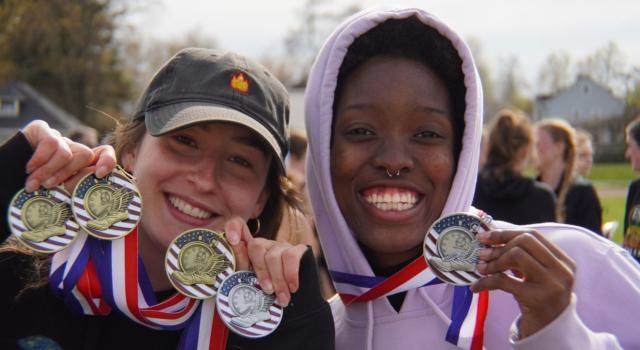A 'Very Hampshire Approach' to Academics and Athletics

For years, one of Alissa Graff’s goals was to play NCAA basketball. When it came time to choose a college, though, she turned away college offers to play NCAA soccer and basketball in favor of the intellectual challenge she knew Hampshire would bring. “At other schools I didn’t feel I was going to be as engaged with my academics, the most important thing for me," she explains. Four years later, she's now focused on academics in her final year at Hampshire: For a Division III thesis project that she designed, she’s examining changes in her home city of Detroit through the lens of conflict and conflict resolution, with a focus on interactions between city communities and governmental and nongovernmental organizations.
Graff arrived at Hampshire with a passion for international relations and politics. First year classes strengthened that interest, and highlighted the importance of taking anthropology courses that aided in seeing political theory “through the eyes of people,” she says.
At the same time, she was becoming involved in Hampshire's soccer and basketball teams, going on to play defense for the 2011 women’s soccer team that qualified for the United States Collegiate Athletic Association national tournament. Hampshire's programs are not affiliated with the NCAA.
“It was exciting as a first-year student to see upperclassmen doing their readings while we were on the way to a game,” says Graff, “It reaffirmed how important it was for me to be both a student and an athlete. Sports are a way to get to know people outside the classroom, but also to get to know what people are passionate about in class. It’s a great group. You’re never going to meet a boring person at Hampshire.”
Graff spent a year in Scotland, at the University of Edinburgh, a school with a strong international relations program and, as it turns out, an equally impressive Ultimate Frisbee team that she helped win a national championship. One of the most important things Graff took away from that year abroad was a heightened appreciation for Detroit, the city where she grew up. “The farther from home I was,” she says, “the more important my ties to Detroit felt.”
After returning to Hampshire, Graff began taking more courses on urban studies and critical race and class theory. Two internships in Detroit this past summer, with Wayne State University’s Center for Urban Studies and with the planning organization Detroit Future City, were influential in her research toward designing her personalized Division III capstone project.
“With Detroit Future City, I was working in civic engagement, trying to figure out how to involve the community in bringing about changes planned in the group’s fifty year framework for the city,” says Graff. “Playing in soccer and Ultimate Frisbee leagues was helpful in understanding what’s happening in the city, because within those leagues are many people involved in the nearly-constant changes happening today in Detroit.”
Being able to do work like that while staying active in the sports she loves, Graff says, makes going to Hampshire “one of the best decisions I’ve made in my life so far.”
“Hampshire has enabled me to explore and find out what I’m passionate about” and, she says, the generous financial aid package made attending the College more affordable than a public university.
“With sports here,” she says, “the goal is to work as hard as you can, play as hard as you can, and work really well as a team. That’s a very Hampshire approach.”



